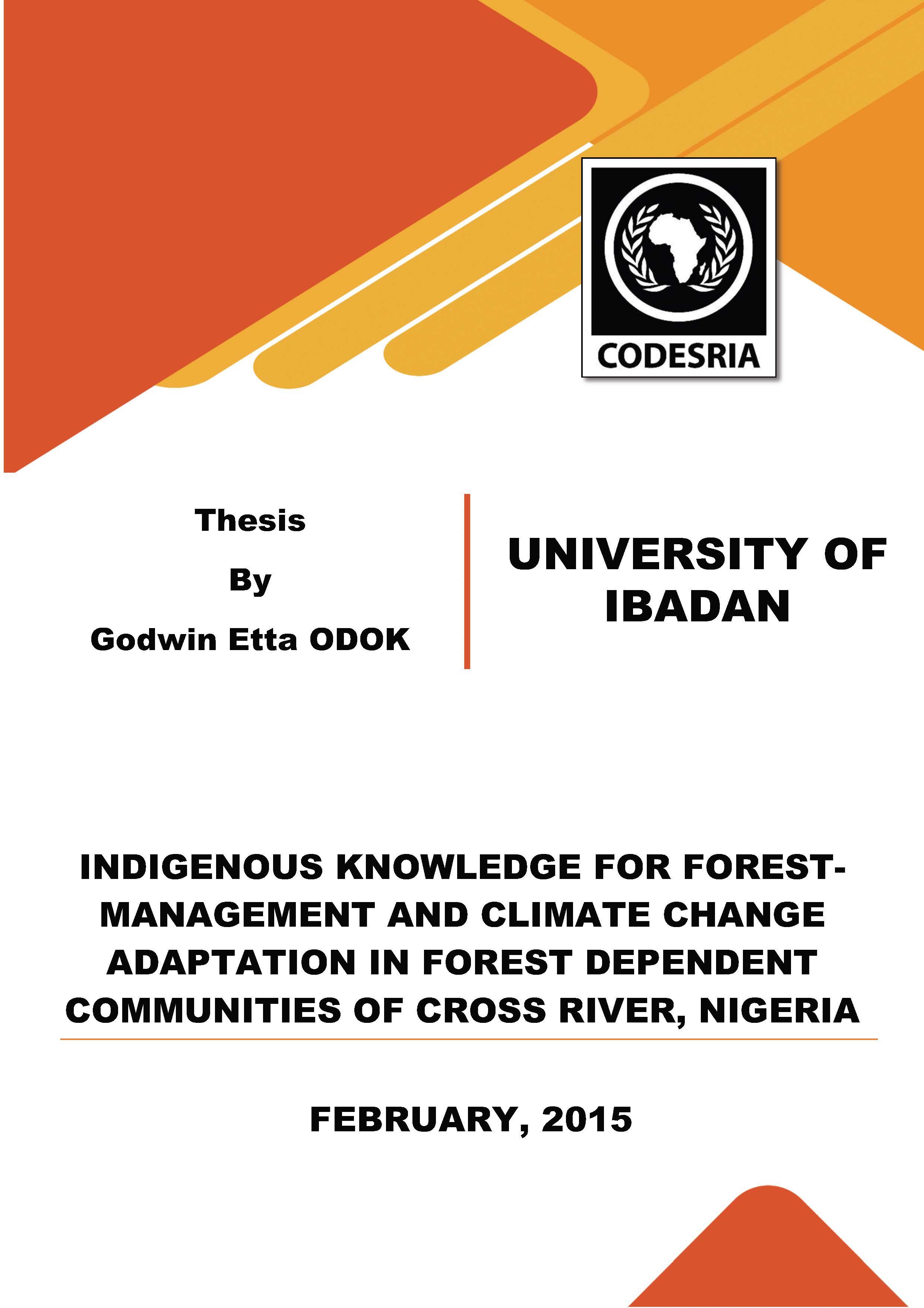INDIGENOUS KNOWLEDGE FOR FORESTMANAGEMENT AND CLIMATE CHANGE ADAPTATION IN FOREST DEPENDENT COMMUNITIES OF CROSS RIVER, NIGERIA
Mots-clés :
Forest-management, Forest-dependent communities, Indigenous knowledge, Climate change adaptationSynopsis
Climate change is a major global human development challenge. Modem technologies have been largely unsuccessful in tackJing this challenge, thus indigenous knowledge for forest-management is being considered as an alternative solution. There is dearth of knowledge on the effects of cultural factors on climate change adaptation in forest-communities of Cross River, hence, this study examined the extent to which beliefs and practices of forest-management in forest-dependent communities of Cross River are engaged in addressing challenges of climate change.
Ecological modernisation served as the theoretical framework while the research design was Participatory Rural Appraisal. A semi-structured questionnaire was used to collect information from 459 respondents purposively selected from three forest-dependent communities representing mangrove forest (Iko-Esai, 153), Ekuri forest (Agoi-Ibami, 191), and Mbe/Afi forest (Butatong, 115) blocks. Quantitative data collected was on socio-demographic characteristics, indigenous beliefs and practices, and their influence on climate change adaptation behaviour. Indigenous knowledge was assessed with an 8-item instrument
which categorised indigenous forest-management practices into: zero-tilling, soil-mulching, bush-fallow, crop-rotation, green-manure, mixed-cropping, tree-felling, hunting taboos, and tree planting. Key Informant Interviews were conducted with 12 officials of the Ministry of Environment, and 33 In-Depth Interviews with 18 community leaders, seven forest managers, five academics, and three policy makers on forest-related traditions and practices. Climate change and transforming social structures were assessed through reviews of archives, reports and maps. Transects were used to identify similarities and differences of paths. Seasonal calendars assessed sequences of events and their relationship with the people; while institutional analysis assessed communities' interests, layout, infrastructures, health and wealth patterns.
Quantitative data were analysed using descriptive statistics and linear regression at p<0.05, while qualitative data were content analysed. The age of respondents was 40.5±4.5 years while 61.7% were males. Over 75.0% had lived in communities since birth, while 88.0% had a monthly income of Jess than W50,000. Effect of indigenous knowledge on cl imate change adaptation behaviour was significant (F= l 7.04; R=0.61 ; R2=0.37, Adj R2=0.35). Climate change adaptation behaviour was influenced by indigenous knowledge thus: use of fuel efficient cooking devices (P=0.34), seed exchange of early maturing crops (P=0.32), planting trees (P=0.27), poultry farming (P=0.13), bee keeping (P=-0.47), planting special species of crops (P=-0.30), migration to another community (P=-0.20), storing enough rainwater (P=-0.14), change period of planting crops (P=-0.1 3), fish farming (P=0.11 ). Indigenous forest-management practices occurred as: bush fallow (88%), mixed cropping (86%), green-manure (62%), tree-felling and hunting taboos (58%), tree planting (55%), soil mulching (53%), zero tilling (47%), and crop rotation (46%). Indigenous practices used to manage forests such as preservation of special species of trees, folklore on appeasement of forest gods, non-hunting of certain animals considered as agents of the gods, and non-sale of land were at risk of extinction. Oral tradition was the main source of disseminating indigenous knowledge, beliefs and practices.
Indigenous knowledge and practices are useful in forest-management. Predominant climate change adaptation measures within forest-dependent Cross River are biased towards modem worldview. Therefore, the use of indigenous knowledge in forest-management should be strengthened in the policy process of climate change adaptation.
Téléchargements
Références
Mol, Arthur, P.J and Sonnenfeld, D.A. 2000a. Ecological Modernisation Around the World: An Introduction, Environmental Politics, Vol. 9(1 ). Pages 3-14.
MONRE/UNDP/DFID. 2009. Vietnam Ministry of Natural Resources and Environment/UNDP/DFID. Building Resilience: Adaptive Strategies for Coastal Livelihoods Most at Risk to Climate Change Impacts, In Central Viet Nam. Monograph.
Moronkola, O.A. 2006. Review of Literature and Theoretical Framework. G.O. Alegbeleye, I. Mabawonku and M. Fabunmi (eds.). Research Method in Education. Ibadan: Faculty of Education, University of Ibadan. Pages 98-111.
Msheliza, D. 2011. Rural and Urban Livelihoods. Climate Change Adaptation Strategy Technical Reports - Nigeria (CCASTR), A Compendium of Studies Commissioned and Published by Building Nigeria's Response to Climate Change (BNRCC) Project.
Mwabu, Germano, and Thorbecke, Erik. 2004. Rural development, growth and poverty in Africa. Journal of African Economies 13(1). Pages 16-65.
NASPA-CCN (National Adaptation Strategy and Plan of action on Climate Change for Nigeria). 2011. Draft for Stakeholder Review, Prepared by the Building Nigeria's Response to Climate Change (BNRCC) Project.
National Intelligence Council. 2008. Global Trends 2025: A Transformed World. Washington, D. C: US Government Printing Office.
Nhemachena, Charles, Rashid Hassan, and Kurukulasuriya Pradeep. 2010. Measuring the economic impact of climate change on African agricultural production systems. Climate change economics 1(01). Pages 33-55.
Obono, 0. 2009. The Connection among the Problem, Objectives, Results and Impacts of a Scientific Research: Towards the Development of a Fractal Approach. Labode Popoola, Olawale Adetimirin and Olajide Olorunnisola (eds.). Planning and Writing GrantOriented Proposal: Proceedings of a Training of Trainers Workshop. Ibadan: The Postgraduate School, University of lbadan.
Ogidi, Ambrose W. 2011. Climate Change and Emerging Socio-Economic Consequences in Nigeria. Proceedings ofl61h Annual Conference ofthe Anthropological and Sociological Association o(Nigeria (ASAN). University of Ilorin, Ilorin. Pages 289-298.
Okaba, B.O. 2005. Resources Degradation in Africa. Journal of globalization and International Studies, Vol. 1 (I). Pages 12-20.
Okafor, J. C. 1977. Development of forest tree crops for food supplies in Nigeria.Forest Ecology and Management 1. Pages 235-247.
Oladimeji ldowu Oladele and Ademola K. Braimoh. 2010. Traditional Land Management Techniques for Climate Change Mitigation. Suneetha M. Subramanian and Balakrishna Pisupati (eds.), Traditional Knowledge in Policy and Practice: Approaches to Development and Human Well-Being. Tokyo: United Nations University Press.
Olorunnisola Abel Olaj ide. 2013. Harnessing the Forester 's Harvest for Sustainable Development. An Inaugural Lecture 20 12/20 13, University oflbadan, May 16.






